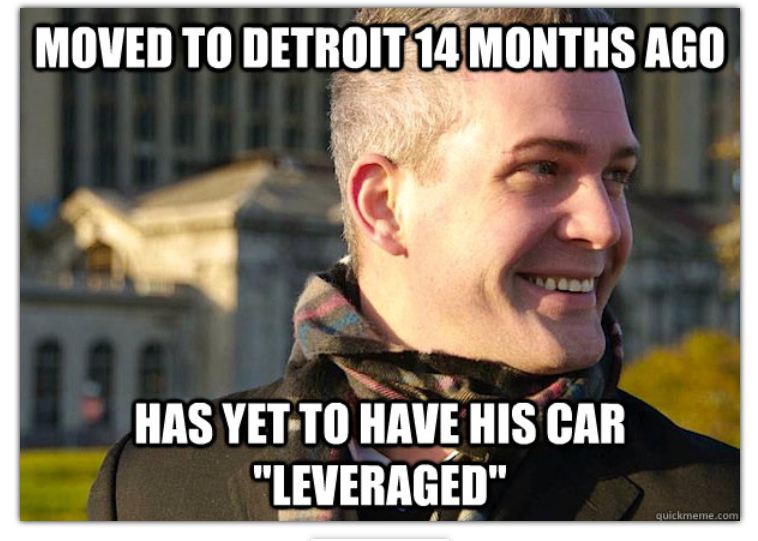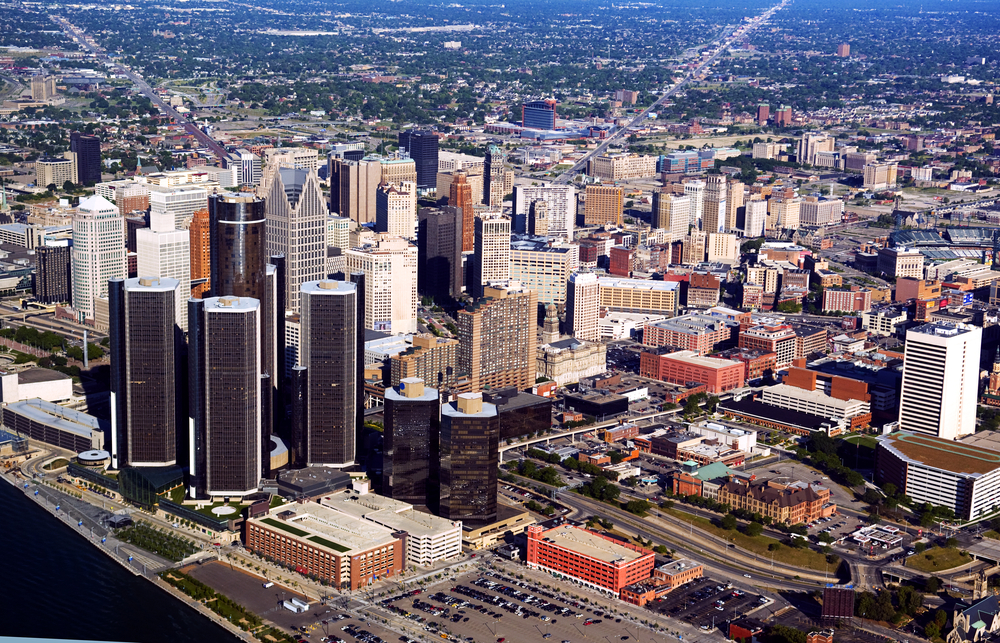What you risk when you have your struggles publicized as widely as Detroit’s is attracting more ambulance chasers than medics.
That is, when the call for help is too big and too wide, you can attract people who come more for their own gains than the city’s. But of course there is a danger too of not asking for help, of stubbornly keeping the doors closed, so the disease festers as the edges fray even further. Because for all the hype, Detroit, with its bankruptcy and blight, still needs a lot of help.
“Detroit isn’t going to be saved by one big thing,” said April Boyle, the Detroit native, all-mom band lead vocalist and Build Institute executive director. “It’s going to be saved by a million little things.”
One of the big themes of any entrepreneurship story in Detroit (a city pestered by reporters) is one of access and motivation. This was the case at the Tomorrow Tour event held at TechTown Detroit, as part of the first multi-city event series Technical.ly produced with Comcast NBCUniversal.
“This has to be about more than just affordable real estate,” said Paul Riser, Jr., the managing director of technology-based entrepreneurship at TechTown, a business accelerator founded in 2000 by leaders at Wayne State University with General Motors and the Henry Ford Health System. “There are reasons to build here.”
The city’s legendary automobile manufacturing reputation looms — Boulder-bred TechStars brought a mobility-focused accelerator and the 135,000-square-foot, GM-founded TechTown is adjacent to transportation technology incubator NextEnergy. There, too, are budding strengths in food and urban agriculture (shoutout to Campbell’s $231 million acquisition of suburban Garden Fresh last year), said Amanda Lewan, the cofounder of the Bamboo Detroit coworking space and editor of Michpreneur, a founder-focused news site.
Detroit also has the bones and the soul of all big cities — diversity (including a fair bit of gender-balance in IT salaries), research universities, culture and history and infrastructure (some of which is getting turned back on).
But for all that good sense, it’s hard not to instead focus on the passion that’s behind a city portrayed as in crisis.
Even those who think the fears are overblown say so with conviction. Ask Ida Byrd-Hill, a Detroit-native edtech founder, who stood up during the Tomorrow Tour and announced to applause: “We are not rebuilding ourselves.”
No, say those most seriously pinning their entrepreneurship dreams to Detroit’s future, it isn’t that the city needs to be remade.
“It’s an opportunity and the feeling that there is real work to be done,” said Jason Lorimer over $5 glasses of Tempranillo one night last month.
The founder of Dandelion, a seven-person civic-tech consultancy that serves as something like a general contractor on large projects, has been in Detroit for four years. First he moved from Philadelphia to follow an investment in a previous company of his, and then he stayed anchored to the network he built here. Lorimer is representative of so much Detroit change — and got pilloried for just that.
Well-intentioned as he may have been from the start, a 2013 essay of his on coming to Detroit to join in “its future” led his likeness to be used to symbolize a certain-kind of much criticized city newcomer: the white male entrepreneur and self-styled savior. Dozens of meme photos of him were shared by Detroiters who were trying to understand what it meant to be a struggling city with so much national attention and a new crop of excited residents.

Despite that experience, or perhaps even because of it, Lorimer is careful and intentional in how he describes his relationship with the city. Sniffing out authenticity is a survival tactic in a place and a time like Detroit today.
“I think I’m going to be here a long time,” Lorimer said, smoking in the backyard of Motor City Wine in Corktown, one of those urban neighborhoods that are both hip and still very much full of longtime residents who are perplexed by their home’s sudden hipness. Motor City Wine itself could perhaps only exist in Detroit today: it’s along the auto-inspired, multi-lane Michigan Avenue and on the grounds of a former biker bar, next to a vacant lot, across from a White Castle drive-thru and filled with urbane oenophiles on a budget listening to a live jazz quartet.
Indeed, a sprawling city with a population now just a third of its 1950s peak can give newcomers the sense of possibility.
“You can do anything here. Not because it’s a playground but because they’ll help you,” if you’re in it for the right reasons, said Stella Safari, a director at Ponyride, a network of rent-subsidized spaces for artists and social entrepreneurs. “You can’t rely on the Detroit brand. Don’t come for the romance. There’s too much work to do.”
“Every empty storefront wasn’t empty at some point. Every place in Detroit has a story already,”said Niles Heron, a cofounder of Michigan Funders, an equity crowdfunding platform. “We’re not starting over, or white-washing. If anything, we’re adding to something.”
For all the optimism, it must be muted. Detroit is still the biggest poor city in the country. Only Philly rivals Detroit’s abandoned property crisis. Forget the stories of Bay Area expats flocking here. Detroit is still more Milwaukee than San Francisco.
“And thank God for it,” said Jessica Robinson. She’s the friendly face of TechStars locally, a civic-minded startup junkie who organizes urbanism meetups for fun. She is exactly one of those coastal expats: after stints in the Bay Area and Portland, Ore., a short-term tech activation job brought her here but she stuck around. Detroit faces challenges that mirror more of the rest of the world than those in bejeweled Silicon Valley, she said.
Robinson followed the golden rule from Detroit SOUP Director Amy Kaherl: “Come to Detroit and bring your job with you.”
Perhaps no big city has more separated its tech and startup stories from each other. No one assumes scalable software is your bag when you say you’re a founder here. Look at how Kaherl’s SOUP, a popular regular communal dinner turned IRL crowdfunding platform, has stretched beyond social good into business access, funding and supporting hyperlocal founders with microgrants of hundreds of dollars at a time.
“Art isn’t the only thing that has to be creative,” said Kaherl. “We can look Detroit’s problems and use the resources that have always been here with our own outlook.”
That can also mean a more inclusive founder ethos, said Boyle of the Build Institute: “We want to be a leader in equitable entrepreneurship in the world,” she said of Detroit. But that doesn’t mean she wants distance between small-scale businesses and the corporate community.
“Get our nano-entrepreneurs mixed in with the big tech giants,” she said. “You can’t aspire to something you’ve never seen.”
And Detroit still has its giants — Chrylser is now downtown, plus General Motors and Compuware still scrape the sky, in addition to a common mix of universities, government and health centers.
https://www.youtube.com/watch?v=NtGoM8uLAZQ
There’s also Dan Gilbert, the billionaire Detroit city native, chairman of Quicken Loans and Rock Ventures, who is remodeling much of downtown Detroit (and Cleveland) with a moneyed billion-dollar paintbrush. His work is big and bold and brash and complicated — can you ever move as fast as he has and be otherwise?
Say what you will, but nearly any big announcement that replaces Detroit’s narrative as another decaying post-industrial city with a twist of tech invariably includes an organization with Gilbert’s fingerprints, like the 2012 launch of a modest Twitter satellite office.
It’s a steep climb. Detroit still has the ghosts of its manufacturing past, “one that was built on being closed with very private ideas,” said the melodiously named Anamarie Sabbagh, a social media strategist who runs Startup Grind Detroit.
Every startup hub needs academic anchors, and Detroit needs them to change its destiny. Hometown Wayne State University has long been a city anchor, and the University of Michigan’s Ann Arbor college town is one way a company like Google can justify a 90,000-square-foot office. Like other cities, Detroit has its coding schools like homegrown Grand Circus, backed in part by Detroit Venture Partners and one of the more than a dozen Iron Yard campuses.
Ah, and there’s that Midwestern work ethic, as so many mention, like Michigan native Jason Raznick, an angel investor who has made the seemingly bizarre decision to build his financial media company Benzinga in Detroit city.
“This truly is the community of and for entrepreneurs,” said Jill Ford, who last year became the City of Detroit’s Head of Innovation. No doubt there is still an unease between a long beleaguered city government and a fast-moving startup community but “city people are starting to show up,” said one founder.
The attention paid to Detroit’s startup community surely outpaces its maturity but that’s likely because the excitement is more for its future than its past. Whatever comes next will be a result of where Detroit is now.
“Innovation comes from extreme deficits and surpluses,” said Heron of Michigan Funders. “I didn’t believe I could build anything that mattered anywhere else but here.”







